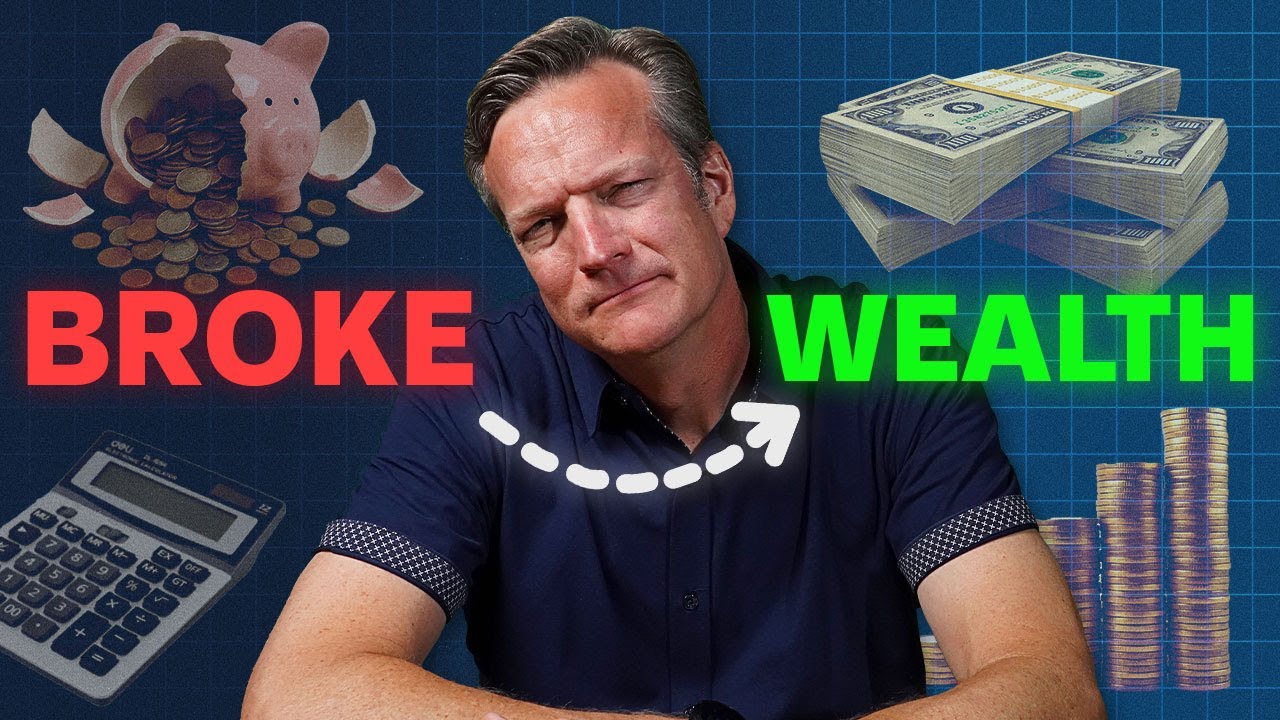Guess what? New data shows Americans are still bad at investing, but we have the solutions right here on the Money Guy show. Every year, Fidelity tracks average 401K balances, or really each quarter. This quarter's data just revealed a shocking stat, and we had to talk about it because it has to do with our 401K balances across America. Do you want to drop it on them, Brian?
Yeah, I just... I feel like Americans were getting whooped. I mean, we were literally whooped by just not doing the right things. If you look at the data from Fidelity, over the last five years, the S&P 500, even with last year, has gained 70 percent. Meanwhile, 401K balances, according to Fidelity (the largest 401K provider in the United States), are only up five percent. There is obviously a big disconnect here. So, we wanted to jump right in and cover what's going on. Why are Americans so bad at building wealth, especially saving for retirement?
Yeah, I mean, we do need to kind of make the point that 2022 was not the best year for the markets, right? The S&P 500 lost 18 percent. But if you look at the five-year performance, the S&P 500 was up 70 percent. So, there's got to be something more. Yeah, you could easily see that even with the 18 percent loss, we were still up close to 90 percent. So, why are the numbers as bad as they are? Here's what we found when we dug deeper into the data. Unfortunately, retirement accounts are very leaky. Apparently, in America, for every dollar contributed to a 401K account, 40 cents on that dollar comes out as a premature withdrawal. That's a lot of money that could be growing and working for you when you really start to think about it.
Yeah, I mean, are you really saving and investing for the future if you pull 40 cents right back out when you put a dollar in? You're not really doing the action you're supposed to. You're only doing about half of the action, and that's disappointing because we already know savings rates are a lot lower than they should be. And look, I'm not heartless. I know that the pandemic was tough. But when you look at the behavior and the actions that occurred during the pandemic by investors, it really breaks my heart because I know how important saving and investing for the future is.
That brings up a great point about why this stat is happening. The laws were relaxed during the pandemic surrounding Americans' access to their 401K retirement plans. We did see that during the pandemic, 58 percent of consumers borrowed or took money out of their 401K or IRA. Now, sure, some of this might have been for an emergency, but I'm going to go ahead and say it, kind of be the cold water tough love: 58 percent is a lot of people.
Yeah, that is a lot of people. What do you think? It's definitely a staggering number. Six out of ten people pulling money out of their retirement accounts during the pandemic. And the government put out a rule that basically said you could pull out, and the language was written in a way that pretty much everybody qualified because we were all living through this pandemic. You could pull out up to a hundred thousand dollars penalty-free. This is what surprises me: of the 58 percent, or close to 60 percent, that pulled money out, 32 percent were taking 75,000 dollars or more. This is getting to be a large sum of money. I even had a conversation with Daniel about this, and I said, "Daniel, dig into the data even more. I want to know how much of this went into consumption for stuff that I consider extra, like vehicles." We found out that it was close to 30 percent of this money that went towards vehicles. It's an appreciating asset, you know, that's not going to do anything for you in the long run. You know, people bought fancier cars than they needed, not reliable transportation, not transportation that qualified under 23.8. I'm talking about something that was glimmering, something that totally undermined what their future retirement could look like. And you know what? We were like, I think what people need to see is a case study of how valuable every dollar that comes into your possession is. If you go to
moneyguy.com/resources, we have a deliverable that will actually show you what every dollar invested can do for you. And there's a reason when we talk about the
Financial Order of Operations, the second step is free money from your employer plan. So it's not uncommon that whatever you put into the plan, your employer is going to give you 50 cents to a dollar. So the money multiplier actually gets multiplied even more than what time and investing can do for it. But I need people to understand, every dollar needs to have a purpose when you're thinking about retirement.
Yeah, there's a big opportunity cost here. So let's break it down. We're not just saying this to be mean about it or anything. It's just, here's what your 401k can do. Here's how much the decision to pull money out of your 401k could cost you. Let's assume a 35-year-old went ahead and took fifty thousand dollars out of there. They didn't even take the max, just took half of what they could take. Maybe it was for a car purchase or something they just decided to go ahead and take fifty thousand dollars out. Because the maximum penalty-free withdrawal was one hundred thousand dollars. So 50k isn't even up to the max, like you said. Here's what that extra fifty thousand dollars would turn into by the time this 35-year-old gets to age 65, assuming an annual rate of return of eight percent. It could turn into 546,787. That's crazy, almost 550 thousand. And we only used the assumption of eight percent. We could easily have said that this rate of return could be nine percent or ten percent. Because if you were just buying the straight-up S&P 500, but we chose eight percent, which I think is very reasonable. Heck, cash is even making five percent now. So you can see that you are undermining and taking from yourself. And I hate to give you captain obvious points on how you fix this, but let's be honest, this is the reality of the situation. Don't take money out of your 401k. That's step one. Just don't do it. I mean, you need this money, your 50-year-old or 60-year-old version of yourself. And I think it's fair to say that the temptation is there. And that's why we wanted to bring this up in the first place. It'd be easy to say, "Well, it's just a little bit." But what are you robbing from your future self?
Well, and it leads to my second captain obvious point, which is always be buying. I get that the world is scary and the pandemic freaked a lot of people out. And if your reaction was not because you required or needed money to pay the rent or for medical expenses, but you did this because you were scared, it was a behavioral side of you that was like, "I'm scared, I'm going to react, I'm going to quit investing into my retirement plan. I'm even gonna pull money out to make myself feel more comfortable." Then you have screwed up and broken through the "always be buying" principle. If you set up an automatic strategy for wealth accumulation that makes it inevitable, you won't have to worry about what's going on in the crazy outside world. Just make it happen, drive through it, and follow the other two concepts. Don't touch the retirement, always be buying. I think your future self will be so happy to give you a big sloppy bear hug because you'll get that great big beautiful tomorrow. Yeah, that was great advice.
So, don't take money out of your 401k. That's the closing statement. It's just because it makes me sad, guys. I get so, so sad for America because I know we really do have so much opportunity and prosperity. But to see that people, if you compare the 2018 balances that Fidelity does to the 2023 balances, and see that they've only gone up essentially one percent a year, there's a big disconnect. And I know you financial mutants out there watching, it's not you. But use this as a pay-it-forward moment. Talk to your friends, talk to your relatives, talk to your neighbors. Let's actually see if we can get people to start making better decisions.













